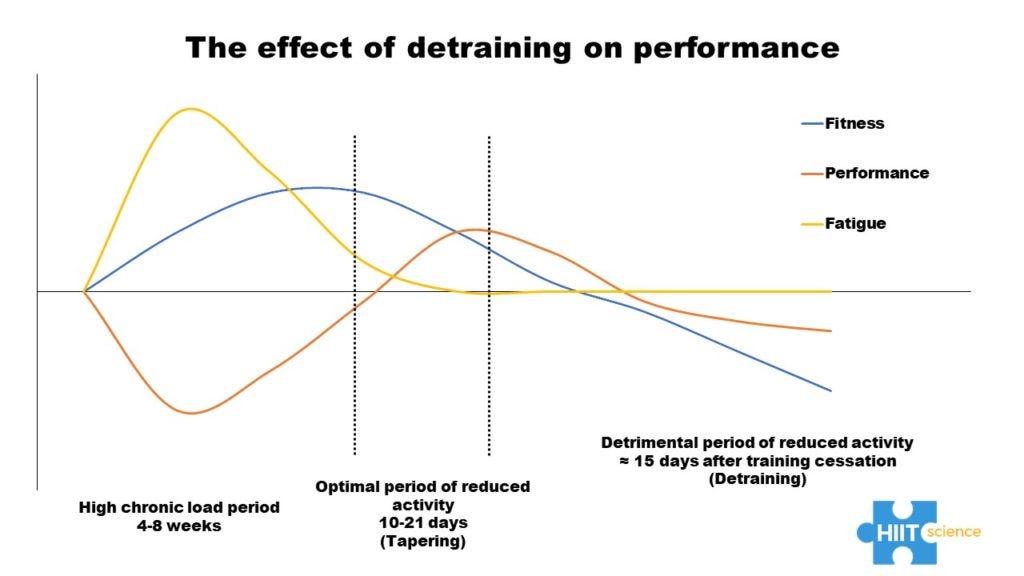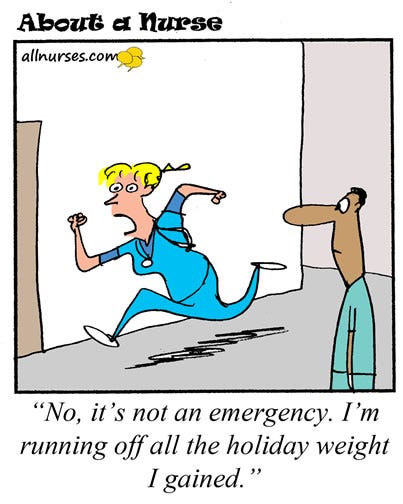Most of us have been locked down for months, and some people are finally planning a holiday. So lets look at how you can stay fit whilst you are on holiday/vacation
This is assuming you cannot cycle/ride as normal…basically what to do when you have to take a short break.
Headlines
Want to avoid deconditioning on vacation? This is actually super simple:
Do something active and eat sensibly
Do something cardiovascular daily even if its taking a walk
Do a weekly HIIT session and a weekly endurance session (if possible)
Cycle if possible, even if one the gym’s old spin bike!
OK that’s clear, but let’s look at the science…..
How long until I lose fitness?
Opinions vary because there may be a temporary boost in performance after a short break in training load as fatigue diminishes. BUT very quickly, and I would say within 24 hours, fitness declines.

Time course of detraining
Think about this, when you are giving your body physical work to do, it is adapting and growing, when you aren’t giving it that work, its resting and declining. Basically we are always either growing or declining!
If your body doesn’t need to work harder, it won’t. It will rest by saving up energy stores (fat) and reducing expensive endurance physiological processes.
Detraining is actually fast initially but becomes subtle later. Everything is affected: cardiac output, VO2max, speed at lactate threshold and metabolic enzymes, blood, resting HR.

Complete training cessation (meaning zero training) for several weeks can result in performance declines of >20%, reducing by 50% (not 100%) per week can keep those losses in the 5–10% range, even if the detraining phase is several weeks in length. Meaning, if you cut your training in half, you are only going to pay a single digit penalty for it.
Time to Recover your fitness
A rule of thumb is
if you reduce training load (TSS) by 20%, then you should be back to full fitness in about half the time you had off
if you reduce training load (TSS) by 50%, then you should be back to full fitness in about the same time as you had off.
if you reduce training load (TSS) by 70%, then you should be back to full fitness in about twice the time you had off.
So lets say you have 14 days off, if you have complete rest it might take 60 days to get back full fitness but if you reduce by 30% you should be back within 9 days.

Recovery Calculator
You can calculate your return to fitness here https://fft.tips/CTL

True, you long term training history will have an influence. In that if your gains are recent, they are more easily lost, but on the other hand if your fitness is really “peaking” there is a long way to fall. Basically if you build your fitness gradually over a long period, and really cement those gains, they will be more resilient to taking time off.

What Exercise to do on Vacation?
Doing nothing at all, and eating badly is a recipe for a big setback. So start in the right mind set: keep a health attitude, healthy diet.
Next try and find what you can do. When time crunched, try and focus on high intensity (HIIT) session at least once per week (ideally 3 times). Usually you will find a gym, or if not, a pool, or sea, or if all else fails there are always two fail safe options:
A. Run/jog outside
B. Body weight exercise

……..Here are Some *Free* Body Weight Apps
The take home
Taking a break is totally normal, indeed it is required. You can take a break and come back to training successfully and get stronger. However it is wise to plan for the deconditioning that is very likely even with a short break. Unless you are injured it is almost always possible to recover from a break.
To reduce the effect of deconditioning, try and keep some activity, and try and focus on intensity for one or two sessions per week.

References
Mujika, Inigo, and Sabino Padilla. “Detraining: Loss of Training-Induced Physiological and Performance Adaptations. Part I.” Sports Medicine, vol. 30, no. 2, 2000, pp. 79–87., doi:10.2165/00007256–200030020–00002.
Mujika, Inigo, and Sabino Padilla. “Detraining: Loss of Training-Induced Physiological and Performance Adaptations. Part II.” Sports Medicine, vol. 30, no. 3, 2000, pp. 145–154., doi:10.2165/00007256–200030030–00001.
Neufer, P. Darrell. “The Effect of Detraining and Reduced Training on the Physiological Adaptations to Aerobic Exercise Training.” Sports Medicine, vol. 8, no. 5, 1989, pp. 302–321., doi:10.2165/00007256–198908050–00004.
Pallarés, Jesús & Sánchez-Medina, Luis & Pérez, Carlos & Izquierdo-Gabarren, Mikel & Izquierdo, Mikel. (2009). Physiological Effects of Tapering and Detraining In World-Class Kayakers. Medicine and science in sports and exercise. 42. 1209–14. 10.1249/MSS.0b013e3181c9228c.
